 MyCatBreeds
MyCatBreeds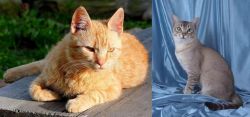 Brazilian Shorthair is originated from Brazil but American Keuda is originated from United States. Both Brazilian Shorthair and American Keuda are having almost same weight. Brazilian Shorthair may live 5 years more than American Keuda. Both Brazilian Shorthair and American Keuda has same litter size. Both Brazilian Shorthair and American Keuda requires Low maintenance.
Brazilian Shorthair is originated from Brazil but American Keuda is originated from United States. Both Brazilian Shorthair and American Keuda are having almost same weight. Brazilian Shorthair may live 5 years more than American Keuda. Both Brazilian Shorthair and American Keuda has same litter size. Both Brazilian Shorthair and American Keuda requires Low maintenance.
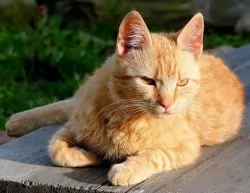 This attractive purebred cat is the first cat from Brazil to get international recognition.
This attractive purebred cat is the first cat from Brazil to get international recognition.
It is amazing that this cat goes back to the streets of Brazil as a feral cat. Centuries ago, when the Portuguese arrived in Brazil, they brought cats with them.
It was in the 1980s that a Brazilian cat breeder wanted to transform certain street cats into purebred cats and the Brazilian Shorthair emerged from these efforts. In 1998, the World Cat Federation gave the cat ‘approval breed’ status.
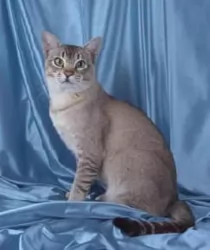 It is thought that the cat was brought to America by the Spanish to keep the rat population down.
It is thought that the cat was brought to America by the Spanish to keep the rat population down.
The name KEUDA stands for Kitten Evaluation Under Direct Assessment which is actually the name of a program that was running in Texas, Oklahoma and New Mexico and was for investigating the kinds of cats that survived as barn cats.
Today the Keuda isn’t registered and it’s not a well-known cat either, being looked upon as being similar to the Egyptian Mau breed as it shares some physical similarities with the Mau.
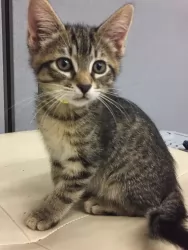 The Brazilian Shorthair is a purebred, medium to large sized cat that can weight between 5 nd 10kg. He is a thick-set cat that is muscular and strong and elegant to look at. The short coat comes in a variety of colors and patterns such as grey, black, orange, white and tan. The coat doesn’t require much grooming, but it is always beneficial to your cat to gently brush him to remove any excess hair there is. This cat has got such beautiful expressive eyes that you feel as if he wants to communicate with you sized cat
The Brazilian Shorthair is a purebred, medium to large sized cat that can weight between 5 nd 10kg. He is a thick-set cat that is muscular and strong and elegant to look at. The short coat comes in a variety of colors and patterns such as grey, black, orange, white and tan. The coat doesn’t require much grooming, but it is always beneficial to your cat to gently brush him to remove any excess hair there is. This cat has got such beautiful expressive eyes that you feel as if he wants to communicate with you sized cat
This is an adaptable cat that is able to adjust to the lifestyle you provide him with. He is an outgoing, intelligent, and inquisitive cat and enjoys the company of his human family, whether that includes children and other pets.
He gives a lot and expects lots of attention back from his humans. He is an inquisitive cat and loves to be going on his own adventures exploring.
He loves life and won’t enjoy a lifestyle where he is expected to lie around most of the day. He is intelligent and can learn tricks, and even though he is an elegant looking cat, he likes being active, spending time outdoors, and putting his hunting skills to the test.
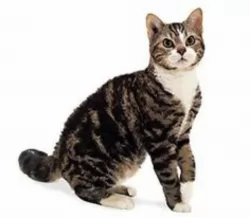 You can’t really pin-point what the American Keuda looks like as it looks a lot like the Maus but it can also look like a Siamese cat or even others.
You can’t really pin-point what the American Keuda looks like as it looks a lot like the Maus but it can also look like a Siamese cat or even others.
It is a medium-sized cat and can weigh up to 5 or 6kg while being very lithe and athletic. The head of the cat is medium-sized, the ears medium-large, the eyes almond-shaped, and the tail is slightly tapered.
An unusual aspect with this cat is its belly flap – loose skin that flaps at each elbow. The head is wedge-shaped, it has almond-shaped eyes, large ears and the fur is soft and silky and in a variety of patterns as well as solid colors. The coat is short to medium in length and there is no undercoat.
American Keudas are just your regular cat in personality - active, adaptable, inquisitive, and intelligent while being strong and agile.
They are also adaptable and social, getting along well with children as well as other pets in the home. It is also quite unusual in that it likes playing with water. They are also playful and love running, jumping and climbing and indoors it will want a climbing cat tree.
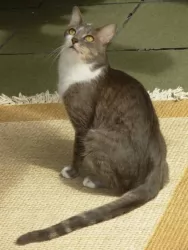 The Brazilian Shorthair makes a great choice for a loyal feline companion and he is a good looking cat too. They love human contact and love spending time with their human family, getting on well with the children in the home as well as other pets.
The Brazilian Shorthair makes a great choice for a loyal feline companion and he is a good looking cat too. They love human contact and love spending time with their human family, getting on well with the children in the home as well as other pets.
They don’t shed a lot either and therefore require little grooming. They’re adaptable pets too and become used to their different environments, loving to explore new places and even meeting new people.
They’re intelligent and can learn a few tricks that you’d normally teach a dog. As an intelligent cat, it loves to be challenged.
With so much going for him, no wonder the friendly, adaptable Brazilian Shorthair cat is such a popular breed as a domesticated house cat.
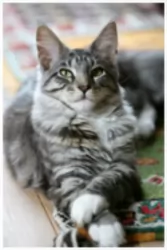 The beauty of American Keuda cats is that they are no-fuss cats and they are energetic, amicable, social, and playful and they make wonderful companions.
The beauty of American Keuda cats is that they are no-fuss cats and they are energetic, amicable, social, and playful and they make wonderful companions.
They are also fond of water and can even strike up a friendship with your dog. By bringing a Keuda into your home you can rely on a steady, loving friendship with your feline friend.
 The Brazilian Shorthair is a robust cat and doesn’t suffer from many health issues.
The Brazilian Shorthair is a robust cat and doesn’t suffer from many health issues.
Like several other cats, one of the common health issues to watch out for with the Brazilian Shorthair is polycystic kidney disease, where cysts form on the kidneys and eventually lead to kidney failure.
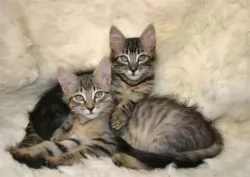 Thes cats enjoy good health and live to be 15 years of age or older even. You just have to watch out for him as they have no undercoats and it’s not a cat to do well in the cold.
Thes cats enjoy good health and live to be 15 years of age or older even. You just have to watch out for him as they have no undercoats and it’s not a cat to do well in the cold.
Whenever you buy a cat for the first time, try and find out about vaccines and previous conditions that might require special treatment.
Healthy kittens and cats are always alert and energetic with shiny coats and clear eyes.
Dental disease is quite common in cats, and it is always a good idea to have your pet’s teeth checked by your vet. Signs of pain with dental problems can include lethargy, pawing at the mouth, facial swelling, and reduced appetite. Get your cat immediately to the vet if you suspect problems with his teeth.
Neutering and spaying are imperative if you don’t want your pet to have kittens. It’s a simple operation for your pet and it comes with many health benefits for your cat. You don’t want your female cat having kittens as there are just already so many stray cats in shelters. Spaying and neutering mellows a cat too, makes them less prone to wandering, spraying, and fighting.
Make sure you have your American Keuda vaccinated against the many cat diseases that there are. Vaccinations are available against feline infectious enteritis or feline parvovirus, cat flu and feline leukemia virus, a disease that damages the cat’s immune system. Kittens require their first vaccine at around 8 weeks of age.
 The Brazilian Shorthair has a short coat and won’t require too much grooming, although a gentle brush once a week is enjoyable. It becomes a bonding time with his owner and it keeps the coat free from dust and loose hairs.
The Brazilian Shorthair has a short coat and won’t require too much grooming, although a gentle brush once a week is enjoyable. It becomes a bonding time with his owner and it keeps the coat free from dust and loose hairs.
Check inside your cat’s mouth and make sure that all his pearly whites are just that. Sometimes a rotten tooth that he can’t tell you about can be a tremendous course of discomfort and pain. Also, check inside the ears for dirt and infection.
You can learn to clean the inside of the ears yourself but if you don’t want to do it, your vet or pet groomer can do these things for you – clip the nails of your pet, check the teeth for dental disease and check inside the ears.
Cats are carnivores, so they require animal protein for good health. Wet or dry commercial manufactured cat foods are super convenient and the best ones are excellent for your pet.
If you feel clueless about what to feed your cat, speak to your veterinarian who will guide you on the right food to give your pet. Certainly, your cat will need meat to get the nutrients he so badly needs.
The amount of food your cat needs to eat each day will depend on his age, weight, and activity levels. You want to get the correct amount of food right as obesity is a common health issue with cats and can contribute to a shorter life span. Always make sure your cat has access to fresh, cool drinking water.
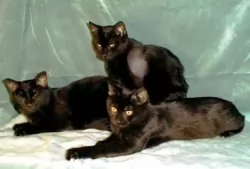 Every cat needs to be fed a complete, balanced high-in-protein food. There are heaps of different brands of cat food on the market - wet and dry. Always follow the manufacturer’s instructions and recommended amounts. If in any doubt about what to feed your cat, speak to your vet. Every cat needs a constant supply of fresh, cool water.
Every cat needs to be fed a complete, balanced high-in-protein food. There are heaps of different brands of cat food on the market - wet and dry. Always follow the manufacturer’s instructions and recommended amounts. If in any doubt about what to feed your cat, speak to your vet. Every cat needs a constant supply of fresh, cool water.
Both young and older cats love to play so ensure you provide your cat with stimulating toys as well as things such as climbing trees and a scratching post. Cats enjoy a high-up place where they can feel safe and view their surroundings from a height.
Cats spend many hours a day sleeping and you need to provide your cat with a warm, dry, comfortable, quiet place to rest. There are many cat beds available, but if you don’t have one, a cardboard box with one side removed and a soft cushion or blanket will do.
Invest in a litter box for your cat to do his business in and keep it in a safe, quiet place where your cat can ‘toilet’ in peace and quiet. These should be placed away from the food and water bowls. Make sure to keep a small plastic rake close by and rake up the cat droppings regularly to ensure the litter tray is nice and clean.
Your American Keuda is a short-haired cat but you want to brush the fur gently at least once a week. Grooming also provides you and your cat with some valuable bonding time.
Provide your cat with a collar to show everyone that he is yours. Also, have your cat microchipped – a tiny chip that carries your pet’s unique ID number and which is inserted safely and gently under the cat's skin.
Have your cat treated and free from parasites such as ticks, fleas, and worms. Speak to your vet about this.